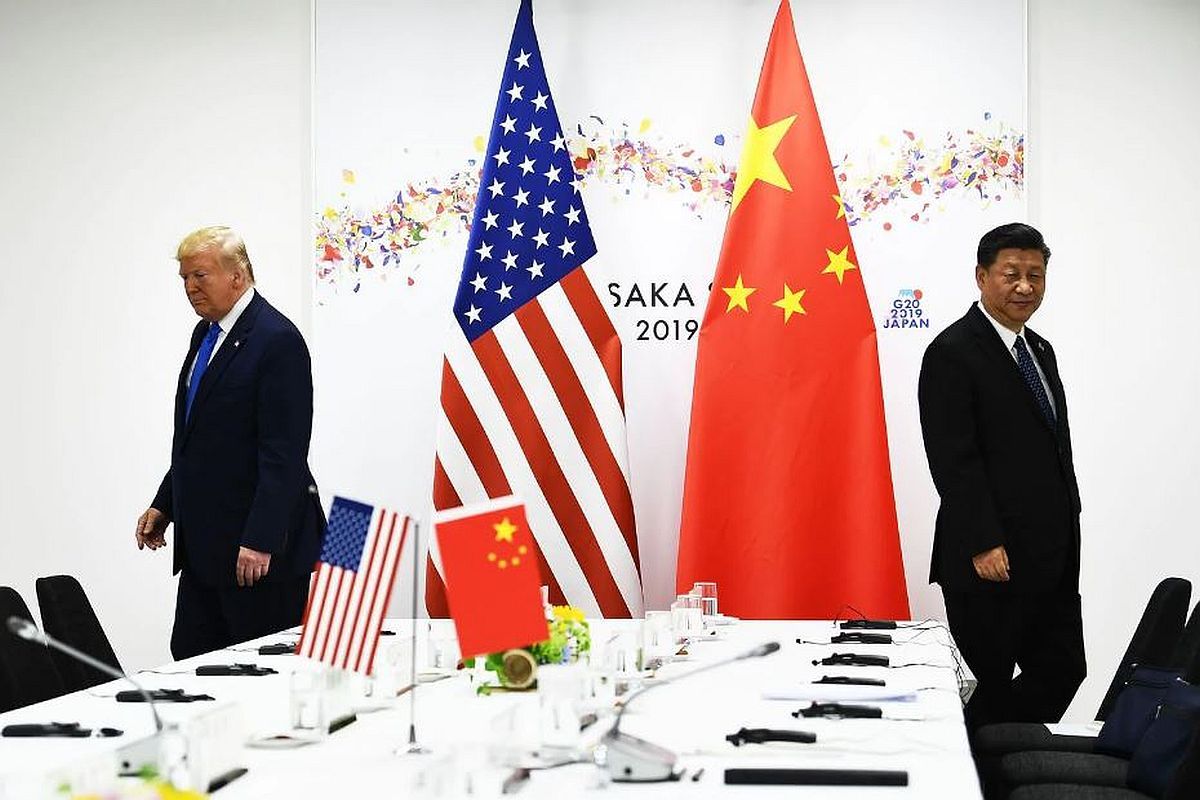As tempers flared in Washington…
Donald Trump and his Vice President JD Vance together targeting Ukrainian President Volodymyr Zelenskky in full media glare is a spectacle not witnessed in years.
Describing it as ‘unprecedented escalation’, China’s foreign ministry said the move was unilaterally initiated by the US and Beijing would ‘react with firm countermeasures’ if the ‘erroneous decision’ was not revoked.

China's President Xi Jinping and US President Donald meet on the sidelines of the G20 Summit in Osaka. (File Photo: AFP)
US-Chinese relations, already tense over the Coronavirus pandemic and Beijing’s crackdown in Hong Kong, hit yet another low point as Washington on Wednesday ordered the closure of the Chinese consulate in Houston within 72 hours.
Further, US President Donald Trump also threatened more consulate closures, telling reporters “it’s always possible.”
Advertisement
“As far as closing additional embassies, it is always possible,” he said.
Advertisement
On shutting Chinese Consulate in Houston, Trump said, “We thought there was a fire in the one we did close, I guess they were burning documents and papers. I wonder what that is all about”.
The closure of the Chinese diplomatic installation in one of America’s biggest cities marks a dramatic escalation in tensions between the world’s top two economies.
As per the New York Post, Houston police had received reports that Chinese officials were burning documents at the Consulate on Tuesday evening. A news reporter’s video showed several people surrounding multiple trash cans with documents on fire, in the consulate’s courtyard.
Houston firefighters and police, the report said, responded to the fire at the Consulate General office but did not have the authority to access the building.
China has, meanwhile, slammed the US move, which came one day after the unveiling of a US indictment targeting two Chinese nationals for allegedly hacking hundreds of companies worldwide and seeking to steal virus vaccine research.
Global Times, the mouthpiece of the Chinese Communist Party government in Beijing has termed the decision as a “crazy move”.
Describing it as “unprecedented escalation”, China’s foreign ministry said the move was unilaterally initiated by the US and Beijing would “react with firm countermeasures” if the “erroneous decision” was not revoked.
“China strongly condemns such an outrageous and unjustified move which will sabotage China-US relations. We urge the US to immediately withdraw its erroneous decision. Otherwise China will make legitimate and necessary reactions,” the foreign ministry said.
China has also alleged that the US security harassed its diplomatic staff and students and confiscated personal electrical devices and detained them without any reason.
The ministry spokesman Wang Wenbin claimed the United States “opened without permission Chinese diplomatic pouches multiple times, and confiscated Chinese items for official use.”
He also said its embassy in Washington had received “bomb and death threats on Chinese diplomatic missions and personnel in the US.”
Meanwhile, during a visit to Denmark, US Secretary of State Mike Pompeo said, “We’re setting our clear expectations for how the Chinese Communist Party is going to behave”.
“President Trump has said ‘enough,'” Pompeo added.
The secretary of state also cited the indictment of the two Chinese nationals for computer hacking but did not specifically mention the order to close the Houston consulate.
The relationship between the US and China has been on a downward spiral ever since the Trump administration renegotiated new terms for bilateral trade with the Xi Jinping government.
Washington and Beijing are feuding over a slew of issues ranging from trade to the pandemic to China’s policies in Hong Kong, Xinjiang and the South China Sea.
Republican Senator Marco Rubio, acting chairman of the Senate Intelligence Committee, called the Houston consulate the “central node of the Communist Party’s vast network of spies and influence operations in the United States.”
Michael McCaul, Republican Leader on the House Foreign Affairs Committee, echoed this, saying the consulate was the “epicenter” of efforts to steal “sensitive information to build up their military.”
State Department spokeswoman Morgan Ortagus said the consulate was ordered shut “in order to protect American intellectual property and Americans’ private information.”
The State Department said China has engaged in massive spying and influence operations throughout the United States for years.
“These activities have increased markedly in scale and scope over the past few years,” it said.
The Chinese consulate in Houston was opened in 1979 — the first in the year the United States and the People’s Republic of China established diplomatic relations, according to its website.
The office covers eight southern US states — including Texas and Florida. There are five Chinese consulates in the United States, as well as the embassy in Washington.
Meanwhile, in response to US’ action, Chinese state-run tabloid the Global Times launched a poll on Twitter asking people to vote for which US consulate in China should be closed, including the ones in Hong Kong, Guangzhou and Chengdu.
The United States has an embassy in Beijing plus five consulates in mainland China and one in Hong Kong.
Trump’s administration has ramped up pressure on China on a wide range of issues, imposing sanctions over policies in Tibet and Xinjiang, where an estimated one million Uighurs and other ethnic minorities are believed to have been rounded up and held in re-education camps.
The United States has also downgraded relations with Hong Kong after China implemented a new security law which Washington says is in violation of Beijing’s promises of autonomy for the territory.
Last week, Washington formally declared Beijing’s pursuit of territory and resources in the South China Sea as illegal, explicitly backing the rival territorial claims of Southeast Asian countries.
Washington has also infuriated Beijing by banning equipment made by telecom giant Huawei and seeking the extradition from Canada of top executive Meng Wanzhou.
(With agency inputs)
Advertisement